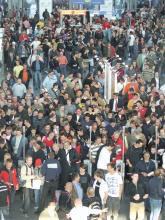The latest data available shows that Europe’s construction market is still suffering turbulence from economic issues. The construction sectors in Greece, Portugal, Italy, Spain and Ireland have all been particularly hard hit, due to a combined effect of high public debt and speculation, built-up during the pre-2008 boom years. This has caused the construction markets of these countries to break apart. Figures from the European Construction Industry Federation (FIEC) show that overall, European construction
RSSThe latest data available shows that Europe’s construction market is still suffering turbulence from economic issues. The construction sectors in Greece, Portugal, Italy, Spain and Ireland have all been particularly hard hit, due to a combined effect of high public debt and speculation, built-up during the pre-2008 boom years. This has caused the construction markets of these countries to break apart.
Figures from the6164 European Construction Industry Federation (FIEC) show that overall, European construction output has fallen from its 2007 high of €1,597 billion to an expected €1,186 billion this year, a -25% drop. At the FIEC’s two day annual conference, which took place during June in Sofia, Bulgaria, the federation’s vice-president Jacques Huillard made a message of caution. He said that EU and national stimulus packages have softened the downturn to an extent. However, he added that most of these stimulus packages have been insufficient to guarantee an environment of sustained revival of economic activity, and stresses that a number of measures announced have not been implemented as of yet.
Overall, sentiment on future outlook for the industry remains weak. Some key contractors are forecasting a 20% drop in 2011 business. This current and future drop-off in infrastructure projects and its consequent reduction in cash flow, combined with the restricted avenues of asset finance, have left many companies looking to downsize their fleets and dispose of excess equipment before the values of their used goods potentially soften in response to the weak market conditions. This means that there will be a ready availability of second-hand machines, with auction companies now looking to sell used machines for export to markets where construction remains strong, such as the BRIC nations.
Figures from the
Overall, sentiment on future outlook for the industry remains weak. Some key contractors are forecasting a 20% drop in 2011 business. This current and future drop-off in infrastructure projects and its consequent reduction in cash flow, combined with the restricted avenues of asset finance, have left many companies looking to downsize their fleets and dispose of excess equipment before the values of their used goods potentially soften in response to the weak market conditions. This means that there will be a ready availability of second-hand machines, with auction companies now looking to sell used machines for export to markets where construction remains strong, such as the BRIC nations.






